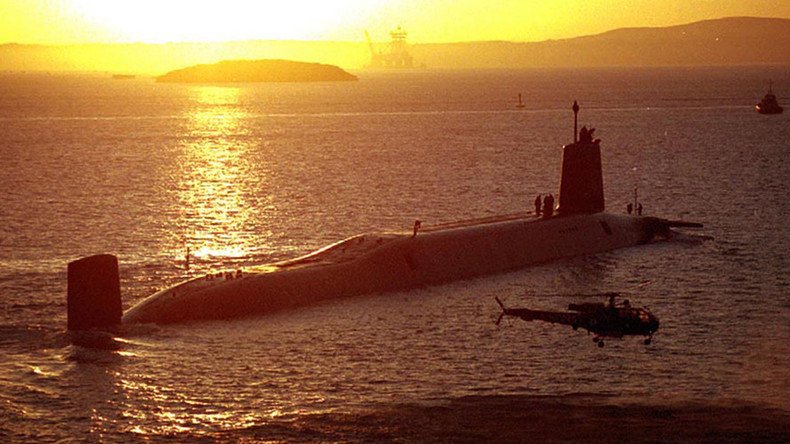Trident: What it means for the UK and why it’s an issue now

Tens of thousands of protesters gathered in London on Saturday to march against Britain’s controversial – and extremely costly – nuclear defense system. Here’s how Trident came to be, and why it’s such a hot issue today.
Thousands gathered today in Trafalgar Square to say #StopTridentpic.twitter.com/P1CIkWxYPx
— Catriona Matheson (@_cmatheson) February 27, 2016
Background
Trident has its roots in the “Polaris” system that began in the 1960s. The system was the UK’s contribution to NATO’s Cold War “nuclear deterrent” strategy against the Soviet Union. Under Polaris, at least one submarine with nuclear capabilities was on patrol at all times, ready to launch a counter-strike should Britain come under nuclear attack.
The policy has continued through the decades, with a submarine constantly patrolling the UK’s borders since 1969. According to UK government documents from 1980, “Since 1969, there has never been a moment when our Polaris force did not have at least one submarine on patrol, effectively invulnerable to pre-emptive attack and at high readiness to launch its missiles if required.”
“We need to convince Soviet leaders that even if they thought that at some critical point as a conflict developed the US would hold back, the British force could still inflict a blow so destructive that the penalty for aggression would have proved too high.”
This readiness was theoretically a deterrent against any other nations launching a first strike. Interestingly, the documents also state that if British forces were ever to launch the weapons, “the strategy will have failed its prime purpose.”
Polaris was replaced by Trident in 1980 under Margaret Thatcher’s cabinet as the result of an agreement she reached with then US President Jimmy Carter, which was kept secret from the British parliament, according to Downing Street papers released in 2011. Under this agreement, Britain would procure Trident missiles from the US.
Under the Non-Proliferation of Nuclear Weapons Treaty, the UK reduced its nuclear forces to the point that Trident remains the UK’s only nuclear weapons system. At present, there are four nuclear armed submarines (one of which is on patrol at all times), each of which can carry eight operational missiles on board.
Why now?
The current Trident system was due to be replaced in 2020. The Conservatives want to replace the system with an updated version, but continue the program as it has been.
Until recently, it seemed that Labour was in complete agreement on this, saying in April of 2015, “Labour is committed to maintaining a minimum, credible, independent nuclear deterrent, delivered through a Continuous-At-Sea Deterrent. This is not up for negotiation with any party.”
Jeremy Corbyn takes the train down from Sheffield to speak at London #StopTrident rally pic.twitter.com/NaTWBf8zZ3
— Matt Sterling (@MSterling27) February 27, 2016
However, Labour’s new leader, Jeremy Corbyn, made his anti-nuclear stance clear during his speech at today’s anti-Trident rally – a position that has reportedly angered some of his fellow Labour MPs.
William McNeilly, a whistleblower who recently came forward to highlight major security lapses at the Trident base, have further discredited the defense program.
READ MORE: EXCLUSIVE: Trident whistleblower William McNeilly breaks silence ahead of London demo (VIDEO)
Cost
According to the UK’s defense ministry, four replacement submarines “will cost £31 billion to build, test and commission, spread over 35 years, with a contingency of £10 billion”.
In October of 2015, Reuters reported that the total cost of replacing Trident and maintaining a successor program will reach £167 billion ($232 billion).
Anti-Trident campaigners argue that funds for the costly and unnecessary program would be better spent on Britain’s failing resources and expensive education system.
#StopTrident so we can spend £100 billion on things that will actually improve our freedom and security.
— James Schneider (@schneiderhome) February 27, 2016
£167,000,000,000 for #Trident missiles OR a fair and just society. We can't have both. London: 27-02-16 #StopTridentpic.twitter.com/LyY6OuCu17
— Dr Paul Monaghan MP (@_PaulMonaghan) February 14, 2016
Corbyn told the Labour conference in September of 2015 that replacement costs for Trident will reach £100 billion ($139 billion), a quarter of the UK’s defense budget.
Kate Hudson, general secretary of the Campaign for Nuclear Disarmament, said that a Trident replacement could cost £183 billion ($254 billion).
A decision on the divisive issue is due to be made later this year, but a vote has yet to be scheduled.












